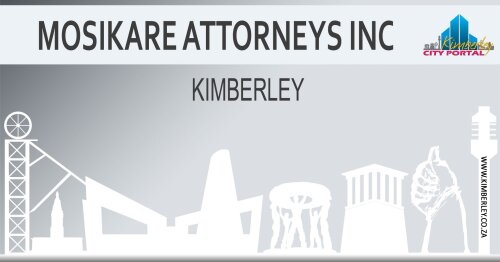Best Renewable & Alternative Energy Lawyers in Kimberley
Share your needs with us, get contacted by law firms.
Free. Takes 2 min.
List of the best lawyers in Kimberley, South Africa
About Renewable & Alternative Energy Law in Kimberley, South Africa
Renewable and alternative energy is a rapidly growing sector in Kimberley, South Africa. Driven by the country's ongoing energy crisis and a national drive toward sustainability, the Northern Cape region, where Kimberley is located, is especially known for its abundant solar and wind resources. This has sparked significant interest and investment in solar farms, wind power projects, and related infrastructure. Legal frameworks have evolved to govern the planning, development, and operation of renewable energy projects, ensuring compliance with both local and national regulations.
Why You May Need a Lawyer
Navigating the renewable and alternative energy sector can be complex due to technical regulations, land use considerations, environmental compliance, and contractual arrangements. You may need legal advice in the following situations:
- Obtaining permits and licenses for starting a solar or wind project.
- Negotiating power purchase agreements with local utilities or Eskom.
- Understanding environmental impact assessments or addressing public participation concerns.
- Resolving land rights, servitudes, or zoning issues for energy installations.
- Complying with health and safety standards and reporting obligations.
- Managing disputes with contractors, suppliers, or partners.
- Accessing government incentives and project financing.
- Intellectual property matters related to innovative renewable solutions.
Local Laws Overview
Renewable energy in Kimberley is subject to a mixture of national and provincial legislation. The following are key aspects of local laws relevant to the sector:
- Electricity Regulation Act: Mandates licensing for electricity generation and sets out requirements for independent power producers.
- National Energy Regulator of South Africa (NERSA): NERSA oversees the approval and regulation of new generation facilities and tariffs, including those based in Kimberley.
- Integrated Resource Plan (IRP): Outlines South Africa's commitment to increasing the share of renewables in the national energy mix.
- Environmental Legislation: Projects must comply with the National Environmental Management Act, requiring environmental impact assessments before commencement.
- Local Municipal By-laws: The Sol Plaatje Municipality (which includes Kimberley) has by-laws governing land use, zoning, building permits, and grid connection for small-scale embedded generation such as rooftop solar.
- Land Rights: Secure land tenure and proper use rights are essential for project development, sometimes involving title deed verification or negotiating leases.
- Government Incentives: South Africa offers programs such as the Renewable Energy Independent Power Producer Procurement Programme (REIPPPP), which require adherence to strict bidding and private-public partnership rules.
Frequently Asked Questions
What types of renewable energy projects are popular in Kimberley?
Solar farms, rooftop solar installations, and wind energy projects are the most common due to strong sunlight and favorable wind patterns in the Northern Cape region.
Do I need permission to install solar panels at my home or business?
Yes, you generally need approval from the Sol Plaatje Municipality and may need to follow application processes for grid connection or building regulations.
What is the process for getting a renewable energy project approved?
You must complete environmental impact assessments, secure land rights, obtain the necessary permits from municipal and national authorities, and ensure compliance with NERSA regulations.
Are there tax incentives for investing in renewable energy in Kimberley?
South Africa offers accelerated depreciation allowances and other incentives for qualifying renewable energy investments. Legal advice can help you maximize available benefits.
Can I sell excess energy generated from my solar panels back to the grid?
Some municipalities, including Sol Plaatje, offer limited arrangements for small-scale embedded generators to feed excess energy into the local grid, subject to specific technical and legal requirements.
What environmental laws affect renewable energy projects?
The National Environmental Management Act requires environmental impact assessments for most large-scale projects, and other environmental regulations may apply depending on project location and scale.
How do I secure land for a renewable energy project?
You may need to own, lease, or obtain servitude over land. Legal assistance ensures compliance with property laws and the proper registration of necessary rights.
What happens if my renewable project faces opposition from the community?
Public participation is essential for permits and environmental approvals. Legal counsel can help manage consultation processes and resolve objections.
Do I need a license from NERSA for my project?
Most commercial-scale and some residential renewable energy projects require licensing from NERSA. Small, non-commercial installations may be exempt, but legal clarification is recommended.
How can a lawyer assist me with renewable energy contracts?
Lawyers draft, review, and negotiate key documents such as power purchase agreements, construction contracts, supplier contracts, and joint venture agreements to protect your interests.
Additional Resources
If you need more information or assistance, consider the following resources:
- National Energy Regulator of South Africa (NERSA)
- Department of Mineral Resources and Energy (DMRE)
- Sol Plaatje Municipality Planning and Building Department
- South African National Energy Development Institute (SANEDI)
- Renewable Energy Independent Power Producer Procurement Programme (REIPPPP)
- South African Photovoltaic Industry Association (SAPVIA)
- Energy Law Society of South Africa
Next Steps
If you are considering undertaking a renewable or alternative energy project in Kimberley, South Africa, or are facing legal challenges in this sector, follow these steps:
- Collect all relevant project information, including land rights, technical details, and intended energy outputs.
- Identify potential legal issues such as permitting, contracts, and regulatory compliance.
- Arrange a consultation with a lawyer who specializes in renewable energy or environmental law in the Northern Cape.
- Prepare a list of questions or concerns to discuss during your legal consultation.
- Follow your lawyer’s advice regarding further documentation, submissions to authorities, or negotiations.
- Stay informed about changes in local and national energy regulations that may affect your project.
Legal advice not only ensures compliance but also adds value by identifying risk and opportunity in Kimberley's dynamic renewable and alternative energy market.
Lawzana helps you find the best lawyers and law firms in Kimberley through a curated and pre-screened list of qualified legal professionals. Our platform offers rankings and detailed profiles of attorneys and law firms, allowing you to compare based on practice areas, including Renewable & Alternative Energy, experience, and client feedback.
Each profile includes a description of the firm's areas of practice, client reviews, team members and partners, year of establishment, spoken languages, office locations, contact information, social media presence, and any published articles or resources. Most firms on our platform speak English and are experienced in both local and international legal matters.
Get a quote from top-rated law firms in Kimberley, South Africa — quickly, securely, and without unnecessary hassle.
Disclaimer:
The information provided on this page is for general informational purposes only and does not constitute legal advice. While we strive to ensure the accuracy and relevance of the content, legal information may change over time, and interpretations of the law can vary. You should always consult with a qualified legal professional for advice specific to your situation.
We disclaim all liability for actions taken or not taken based on the content of this page. If you believe any information is incorrect or outdated, please contact us, and we will review and update it where appropriate.













